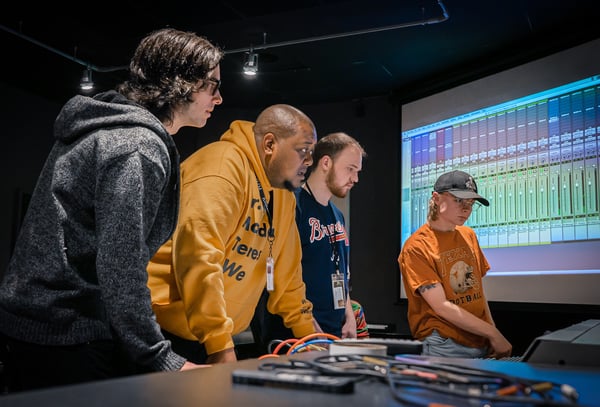4 Reasons to Earn a Music Degree
Think back to when you were growing up.
How many times did your career aspirations change? From a doctor, to a fire fighter, to an astronaut, and so on. Maybe as you read this, you're still in the process of growing up, and your dreams haven't quite actualized yet.
That is okay! But, if you've stumbled upon this article, more than likely you can agree with this statement: musicians are a different breed.
You can take a musician and stick them in an office, working a 9 - 5, but you can't take that passion out of a musician. It just isn't possible. There are many opportunities to separate your dream activities from a career that puts food on the table, but what if you didn't have to?
What if your career could be made up of the very same passion that gets you out of bed in the morning, pushes you to your local record store, and drives you to your favorite venue on a Friday night?
Should you choose to get a music degree for your career, that very same love you have for music could also be your vocation.
If being able to capitalize on that genuine love for music each and every day and turn it into monetary value doesn't quite do it for you (or if it sounds too good to be true), check out our 4 reasons to get a music degree.
Table of Contents:
1. Elevate Your Skill
When you want to learn how to cover songs, you go to YouTube and check it out. This is one case where YouTube works great. It's fast, and is very simple.
What about if you want to learn about music theory in-depth? Sure, you could find a how-to video, but what if you have questions?
Are the "video instructors" you watch for free invested in helping you gain a better understanding or are they trying to capture views, likes, subscribes, and elevate their own brand?
Entering a music college and earning a degree gives you the opportunity to learn from industry-leading instructors who are dedicated to maximizing your own potential. Whether you want to focus on theory, instruments, your voice, or would rather be on the production side of music, you will learn everything from the basics to the most advanced techniques that the pros use.
Meanwhile, you'll be developing these skills in studios while utilizing top-of-the-line equipment. Not a bad gig!
2. Collaboration

Did you ever want to start a band? There are two very common approaches musicians take when attempting to create their first band:
- Gather your close friends who you connect with on a personal level, despite the fact that half of them have zero musical talent.
- Post on about it social media or on craigslist and hope that the person you meet isn't a psycho killer.
Those aren't very lucrative options, are they? If only there were a place that accumulated like-minded individuals with a strong passion for music. I'm sure you see where we are going with this.
By earning a degree in music, another major benefit is the environment that you're learning in. We already touched on the studios and equipment, but what about your peers?
If you are a guitarist and would like a truly talented musician to sing over your chords or riffs, there is an incredibly high probability you'll have at least one amazing vocalist at your school that is dying to sing over original music. If you are more interested in music production, chances are you will have countless musicians at your fingertips to collaborate with.
If you don't think a college environment is great for meeting musicians and starting long-term projects or bands, check this out.
3. Higher Pay
Whether you're in high school or older, one thing you shouldn't ever let anyone tell you is that being a musician or going to a music institute is a sure path to poverty and lack of work. That is a type of negativity that can derail even the most talented musicians and producers.
Now you may be thinking, "well, you're telling me four reasons to go to school and earn a degree in music, so you're biased." That's a fair point; therefore, let's bring some statistics into this discussion.
According to the U.S. Bureau of Labor Statistics, the medium pay for musicians in 2019 was $30.39 an hour. Assuming you work full-time, that is about 63K a year before taxes. Not a bad income for following your dreams, right?
The U.S. Bureau of Labor Statistics also claims that competition is fairly high for music industry careers. A fantastic way to separate yourself from thousands and thousands of self-taught musicians and producers is by earning a reputable music degree.
This will also increase your chances for higher pay when you land yourself a career in music. But now you may be thinking, what do artists do with music degrees?
What Can You Do With a Music Degree?

The job market for musicians is greater than you may think. Some of the opportunities for individuals that graduate from a music program include:
- Gigging or Session Musician
- Accompanist (public and private schools, religious centers, dance rehearsals and performances, theatre performances, etc.)
- Arranger
- Artistic Director
- Music Production
- Choral Director
- Classical Music Composer
- Conductor
- Cruise Ship Entertainer
- DJ
- Educator (K-12, University, College, Conservatory)
- Entrepreneur
- Film Score
- Freelance
- Marching Band Director
- Media Development
- Musician Agent
- Musician or Game Development
- Music Licensing
- Publishing
- Institute Director
- Musical Theatre
- General Performer/Music Performance
- Sound Engineer
- Sound Mastering
- Sound Design
- Song Producer
- Piano Tuner
- Vocal Coach
This is just a hand-full of potential careers options, as well.The opportunities for a driven musician who is ready to work are truly endless.

4. See the World
If you want to work in TV and Film you move to LA. Likewise, if you want to be the next Broadway star, you better buy a flight ticket to New York.
If you desire to succeed in music you should travel to...anywhere? Pretty much. That's one great thing about music; you're not locally limited.
Now, we aren't knocking actors, and sure, there are particular cities that are known for their music scene, but earning a degree and diving into the music industry does not limit you to a handful of states.
Once you graduate, don't play it safe. Take a broad look at your options and use your degree as a vessel to see the world.
Is a Music Degree Worth It?
In the end, what you put into your experience earning a music degree will likely determine what comes out of it.
If you are determined, passionate, and allow yourself to network and learn from the individuals surrounding you, you're setting yourself up for success. Of course, meeting the right connection or having that lucky break can help, but the overall statistics aren't bad at all.
According to Music School Central, over 50% of music students find work relevant to their degree within four months of their graduation and 75% of music education students found work within four months of graduation.
Comparatively, about 25% of students who graduate college in other majors end up working in a field similar to or related to their major.
Keep those numbers in your back pocket the next time someone challenges your desire to earn a music degree!
Attend an Accredited Music College

If you are a dedicated and passionate musician or producer, check out the Atlanta Institute of Music and Media.
AIMM is an accredited music college that offers the following degree programs:
Music and Technology Associate Degree with a Concentration in Guitar, Voice, Drums, Bass or Keyboard
AIMM is truly unique in that our music school combines instrumentation with music production techniques. Therefore, you can master your instrument of choice and learn how to record, mix, and master like the pros.
Remember that long list of career options we listed above? Being well-versed in instrumentation AND music production makes you an incredibly attractive music career candidate.
Music Production and Audio for Media Associate Degree
AIMM is proudly an AVID Pro Tools training partner, which allows our music production students to take courses that are most relevant to the industry, such as Pro Tools 101 and Pro Tools 110.
Follow in the footsteps of AIMM alumni Turbo the Great or Kesha Lee, who recently earned a Grammy for her work on This is America with Childish Gambino.
We are excited to talk about your music career aspirations and set you on the right path with our music degrees. Click the button below to discover how our school can help channel your passion and assist you in turning a degree in music into a successful career.











